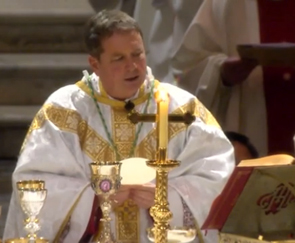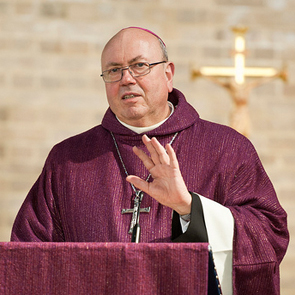Dominican bioethicist Anthony Fisher, who was installed as Archbishop of Sydney on Wednesday, vowed to improve the Church’s record on safeguarding and apologised for sexual abuse committed by clergy.
Giving the homily during his installation Mass he told a packed St Mary’s Cathedral he spoke of survivors’ “harrowing” experiences, “the shameful deeds of some clergy and serious failures of some leaders to respond”.
The 54-year-old prelate said he prayed the Church would “emerge from this period of public scrutiny humbler, more compassionate and spiritually regenerated” and urged disillusioned Catholics to return and “help us be a better Church”.
 The Catholic Church in Australia has been participating with a Royal Commission into institutional child sexual abuse, and there have also been state-level inquiries into historic instances of abuse by religious organisations.
The Catholic Church in Australia has been participating with a Royal Commission into institutional child sexual abuse, and there have also been state-level inquiries into historic instances of abuse by religious organisations.
Archbishop Fisher, who has led the western Sydney diocese of Parramatta for four years, succeeds Cardinal George Pell, who was transferred from Sydney early this year to become Prefect of the Vatican’s new Secretariat for the Economy.
He also described Christianity, Islam and secularism as the “three great ideas that shape the human soul in our age”, noting that they sometimes collided. Respect for religious liberty was one of Australia’s strengths, he said, adding that the country’s wealth, cohesion and peace owed a lot to its Judeo-Christian inheritance, “however under-appreciated that often is”.
Fisher, who has degrees in history, law, theology and bioethics, gave a farewell address to community leaders in Parramatta before his installation.
In it he warned Australians to be vigilant about the separation of Church and state and against religious and secular totalitarianism.
Referring to the so-called Islamic State, Archbishop-elect Fisher said ISIL “is an example of faith ... that uses or is used to achieve control by violence and establish a theocracy".
He also expressed concern at “a totalitarian secularism or atheocracy that, likewise, seeks to banish all those with whom it does not agree” and gave as examples “communist countries that forbid or radically limit worship, religious education and practice; or the increasingly intolerant secularism of some Western countries”.
Read the archbishop's homily here or watch the installation Mass here.


 Loading ...
Loading ...